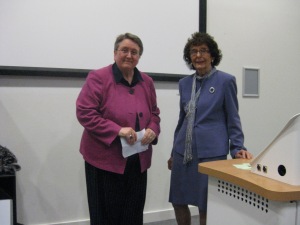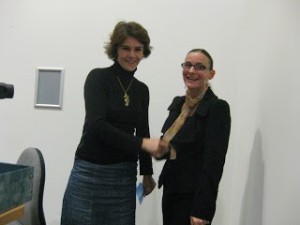On a wild and wet October evening, Hampshire Writers’ Society Chairman, Barbara Large introduced special guest Professor Liz Stuart Senior Pro Vice-Chancellor from the University of Winchester who began by welcoming the HWS to the university campus.
She spoke about her role at the university and her work as a writer. Although one of the smallest universities in the country, only 7000 students, it has made the top ten in the Sunday Times’List of best universities and achieved first place in the country for student satisfaction on its creative writing courses.
 As a theologian, Professor Stuart has written ten books, although much of her time now is spent dealing with academic matters within the university, writing policy documents, academic papers and reports. Once regarded as a radical theologian, one of the delights of her life is when she discovers her work has been the subject of a PhD thesis.
As a theologian, Professor Stuart has written ten books, although much of her time now is spent dealing with academic matters within the university, writing policy documents, academic papers and reports. Once regarded as a radical theologian, one of the delights of her life is when she discovers her work has been the subject of a PhD thesis.
This year marks the 20th anniversary of the publication of her book which was banned by the Archbishop of Canterbury. Ironically, it turned out to be one of her best sellers!
Marc Morris, historian, author and broadcaster
The Guest Speaker, Marc Morris was interviewed by Graeme Pick, who began by asking why there was such a long gap between Marc Morris’ books.
Report by Hermione Laake
Marc’s response was that books take a long time. There was a brief discussion about hot housing, doing a book in 2-3 years. Generally Marc described the time taken to write his work as being around four years, with the first being commissioned in 2004 and then going on to be published in 2008 and the second being commissioned in 2008 and published this year.
Graeme asked M. M how he goes about writing his books.
Much of his research on Edward 1st came about through his thesis on the Earls of Norfolk in the 13thCentury BC. “Edward I conquered Wales had illegitimate children, tried to conquer Scotland and had one of the greatest reigns in British history. I thought that he was due a page turning biography. Someone needs to write a book about this — me.”
M.M described the process of writing as reading other people’s books and a synthesis taking place. But because of the sheer volume of writing available trying to make these disparate texts synthesise didn’t work. Prior to The Norman Conquest, there was much documentation. After the revolution in 1200 the King ordered that copies of messages were kept. These have survived, Consequently, there is more evidence than you could look at. “European historians look at English medieval history and are agog,”
Graeme then asked, “How do you decide what to discard?”
M.M.:“What makes the research process interesting, is when it doesn’t fit. You get your story straight. I would imagine this is the same with every story. Every book I read with that date in, I break it down by year: Jan, Feb, March, the date of whatever, then you discover mistakes,”
He described the tag Narrative History as often thought of as a pejorative term. “Alternatively there is thematic history.. Social history gets in the way whereas narrative history gets the story going. There needs to be a balance between moving the story forward and conveying the story.”
Graeme: “Do you end up in a different place to where you expected?”
M.M: “You’ve got to. You might start with one set of preconception and end up somewhere else…..Edward improved somewhere in my estimation as I was writing the book. You start off with a series of preconceptions you came with, the legend and the bona fide academic material then you end up somewhere questioning those orthodoxies.”
Graeme: “How do you decide which stories are worth telling or retelling?”
M described this as hard sell. It was all about selling the legend, “Have you seen Braveheart—?”
Graeme: “How do you keep the narrative going while having to address the reader?”
M.M: “Where are the breaks and where are the hooks where the chapter ends? Where are the cuts? From an academic point of view that would be cheap tricks. People want to keep reading your book; people want to know what happens next. The academic way is completely different. You assume people know all that already.”
He described this as a balance of keeping the tricks to himself but often not revealing them to the reader, although on some occasions, he said he kept them in.
Graeme: “You seem to be interested in how big characters drive the story. Without these big characters show do you drive the story?”
M.M “Harold dies and with him one of the most important people in history. You’ve lost your antagonist you’ve lost your protagonist.”
He managed to “skip along from 1072 to 1085/6. I brought in a character connected with The Bayeux Tapestry.. I am interested in why these stories matter. How did this affect England, Englishness, how did this affect the language? How did this affect the culture?”
G: “Are you trying to teach people things?”
M.M: “It tells you something about the past society.—Who are the bad guys in the Norman conquest? I was surprised to discover that the Anglo Saxons did slavery in a big way, and the Normans didn’t do that. Harold was a great slave trader. A major cultural shift was brought about by the Normans; Chivalry (not killing your opponent) was a new thing. The Vikings didn’t do this. The English didn’t do it. These are big changes. These affect the way the English view their Celtic neighbours: These people are barbarians we need to conquer and civilise them
“You work as a writer. What other work are you doing to make sure your work gets out there?”
M.M: “I do articles for history magazines, tour for literary festival, I’ve just written an article on slavery.”
G: “Is the Norman conquest a good thing?”
M.M: “No I don’t think it was a good thing….You are considering a balancing testimony, not taking sides. Your main duty as an historian is to get it right. The historian is not a judge. You make the best case and say make up your own mind. This [discussion] was called putting a pulse into the past. That’s not what I do. [I’m asking]… how can I make these bones live? I’m trying to take the pulse of the past.”
Marc Morris’s articles are being collected and published as an E-book next week.
For further information on this Marc’s website
 Mary stressed the importance of properly addressing your correspondence. If you do not get this right, said Mary, then editors will not feel connected to you sufficiently. “Find out about where Mary Chamberlain comes from.” Mary reminded us that agents like letters to be addressed to them specifically, by name. Do your homework on this, said Mary. “Look them up; [similarly] don’t forget your postcode as an agent will be too busy to look it up.”
Mary stressed the importance of properly addressing your correspondence. If you do not get this right, said Mary, then editors will not feel connected to you sufficiently. “Find out about where Mary Chamberlain comes from.” Mary reminded us that agents like letters to be addressed to them specifically, by name. Do your homework on this, said Mary. “Look them up; [similarly] don’t forget your postcode as an agent will be too busy to look it up.”
 As a theologian, Professor Stuart has written ten books, although much of her time now is spent dealing with academic matters within the university, writing policy documents, academic papers and reports. Once regarded as a radical theologian, one of the delights of her life is when she discovers her work has been the subject of a PhD thesis.
As a theologian, Professor Stuart has written ten books, although much of her time now is spent dealing with academic matters within the university, writing policy documents, academic papers and reports. Once regarded as a radical theologian, one of the delights of her life is when she discovers her work has been the subject of a PhD thesis.